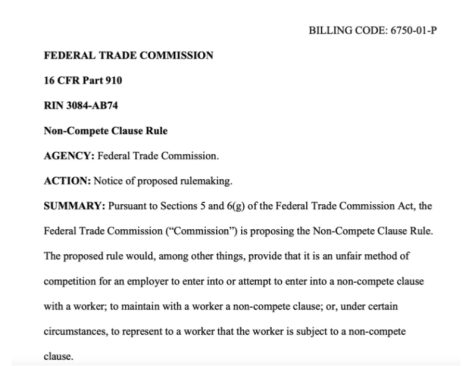The Possible End to Non-Compete Clauses
Recently the Federal Trade Commission has proposed a rule to ban employers from forcing non-competes onto workers.
A non-compete is an agreement that prohibits employees from working with competitor companies after the employment periods ends. Most non-compete agreements usually have designated time lengths that an employee would be banned from pursuing competing companies. These agreements vary heavily in terms of time lengths as well as geographic areas. Breaking a non-compete agreement could lead to a lawsuit.

All but three states allow for non-compete agreements to be enforced in some manner. Depending on the state, these agreements can differ as well. Some states, like Utah, limit non-competes to only a year. Others, like Hawaii, ban non-competes from certain industries. California does not recognize these agreements and if an employers still chooses to attempt to bind an employee to the agreement, they could be sued. Most non-competes last from 6 months to a year.
According to Investopedia, advocates for non-competes argue that it protects trade secrets and reduces employee turnover. However, those against non-competes argue that it weakens the bargaining power of employees, forces employees out of their field of expertise, and restricts employees that have little to no access to trade secrets.
The FTC argues that non-competes have suppressed around $300 billion in wages annually. They also suggest that 30 million Americans are dissuaded from pursuing career opportunities. The FTC is accepting comments on this proposal for a new rule until April 19.
Zach Farrell, an alumnus from the University of North Georgia, signed a non-compete agreement for his current job. It states that he is not allowed to work with the contracts he negotiates for 2 years should he leave his employment.
“It makes sense for some positions/companies to have non competes, but for entry level college graduates I feel like it’s unnecessary. However, if someone builds a book of business somewhere they can’t just quit and take it to a different company, so these non competes protect the company’s relationship with other businesses. Not a huge fan of them but they’re not going away anytime soon.” – Zach Farrell
To find information to submit a comment to the FTC regarding non-compete clauses, use the Federal Register Notice.
Your donation will support the student journalists of University of North Georgia. Your contribution will allow us to purchase equipment and cover our annual website hosting costs.

Hey! My name is Walker Pearson. I am a senior majoring in History with a minor in Journalism. My favourite thing about Journalism is that I get to learn...






























